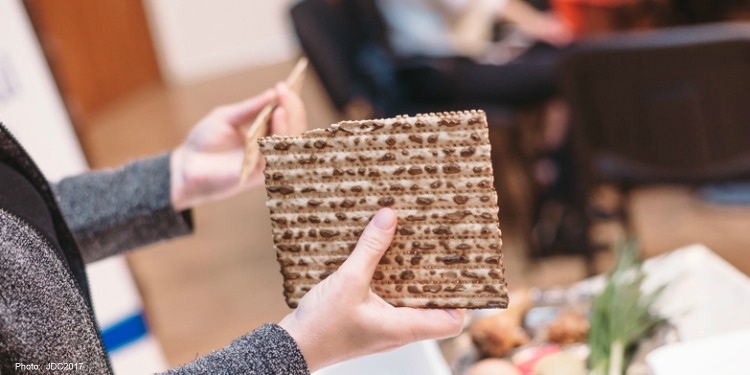Life Lessons from Matzah
The Fellowship | April 5, 2018

This is how my kitchen looked last week, on the day before Passover: Oven racks were scattered on the counter, covered with anti-grease spray; the refrigerator had been taken apart, scrubbed, then put back together through reverse engineering; the dining room table and chairs were scattered in the living room while my kids scrubbed every inch of our wood floors to leave them sparkling clean; and I was scratching my head wondering where in the world I would get the energy to lead my family and guests in a Passover seder the following day after the grueling pre-Passover cleaning I’d just performed.
Somehow, through divine intervention, which at times seemed no less miraculous then the Ten Plagues, the house was ready for Passover, the table was set for the seder, and my family and I received supernatural strength to conduct the Passover seder which went well into the night – we ended at 2:00 a.m.!
The purpose for the intensive preparation is clear: to rid our homes of any remnants of chametz, or leavened dough, which includes cereals, wafers, bread, crackers, and so on. According to biblical instruction, any amount, even a tiny bit, has to be discarded before the holiday, since none of it can remain in our possession throughout the Passover holiday.
Anyone who sees me the day before Passover, with surgical gloves on and a toothpick in hand as I poke at each crevice in my kitchen to eradicate crumbs of chametz, would think I was crazy, or at least a slave to religious neurosis. So, how is this a preparation for a holiday that celebrates freedom?
In typical Jewish fashion, I will answer this question by posing another question: What is freedom?
When asked this question, many people will respond that freedom is the ability to do what they want when they want. But is that truly freedom, or is that just another form of slavery? Slavery to my desires, to my ego, and to materialistic consumption?
When we really think about it, we realize that no human being can be completely free. We are always serving a purpose; the question is, are we free to choose a higher purpose, such as following the biblical command to rid our homes of chametz, or are we stuck in an endless cycle of self-serving enslavements?
As I sat at our Passover seder with my family and friends, I contemplated the simplicity of matzah, which we are commanded to eat on Passover night. Matzah is only flour and water. No other additives like sugar, salt, eggs, oil, or yeast are allowed – just flour and water. Nothing else.
This simple food that the Bible commands to eat on Passover night is symbolic of our freedom. And so, before we made the blessing over the matzah and prepared to fulfill our commandment to eat it, I asked everyone at the table to do so quietly, without talking, and with purpose and intent.
As I was eating my share of matzah, I began to realize how many things I have added to my life in order to “improve” my life, but which, in fact, have enslaved me.
We live in a society where things which were once hard to come by are now easily available. We travel around the globe within hours, and we send letters across the world within a second. With technology, we can accomplish things and have access to information our parents never dreamed possible. And yet, as I ate the simple unleavened matzah, I couldn’t help but think about how enslaved mankind has become to technology, to convenience, to luxury.
Freedom doesn’t mean that I can do what I want when I want. Freedom means that I can choose to focus my time and energy on a higher, divine purpose, which elevates my life and the lives of those around me. In this way, the biblical command to rid our homes of chametz is an invitation to simplify, to be intentional about our relationship with our possessions, and to freely choose to let go of our desires in favor of what God desires for us.
-by Ami Farkas, a writer in The Fellowship‘s Jerusalem office
